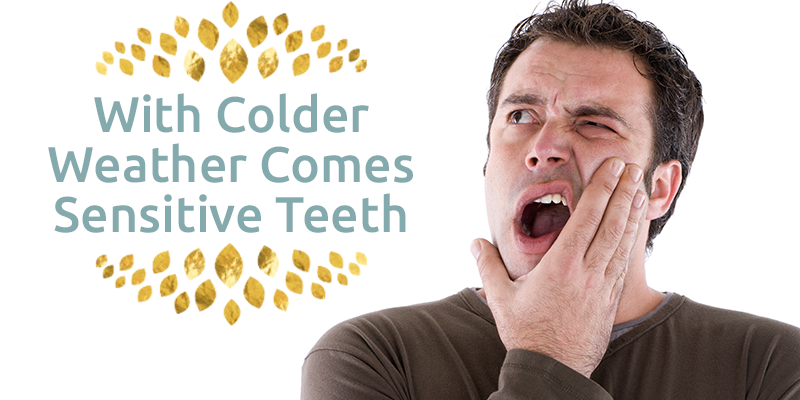After one final blast of warm weather that seemingly came out of nowhere, the winter is here to stay. Like it or not, the colder months are right on our doorstep once again!
For those with sensitive teeth in particular, the colder months of the year can be particularly unpleasant. Even with all the beautiful scenery and cosy evenings in the world, it can be a period of prolonged pain and discomfort. A familiar story for those who’ve struggled with sensitive teeth for many years.
In all instances, it’s a good idea to discuss sensitivity with your dentist. Particularly if your teeth become sensitive having previously experienced no real discomfort, there could be an underlying cause that warrants investigation. Depending on the nature and severity of the issue, there are countless treatments available to minimise or even eliminate discomfort entirely.
Otherwise, it’s simply a case of doing everything you can to enjoy a pain-free winter. The good news being that there are countless tips and tricks to try out, which could make a marked difference when the weather is at its worst.
The following have proved most effective of all for millions of sensitive mouths across the UK:
- Breathe through your nose
First up, if you can get into the habit of breathing through your nose, it’s something you should be doing right now. Mouth breathing can be surprisingly unhealthy for a variety of reasons. Along with being a common cause of dry-mouth, breathing through the mouth can also expose the teeth to cold air. Not to mention, rapid temperature changes when going from warmer indoor areas to colder outdoor areas. Even if it doesn’t come naturally at first, it’s surprisingly easy to train yourself to breathe through your nose.
- Avoid boiling hot beverages
There’s much to be said for the warmth and cosiness of a hot drink in the wintertime. Unfortunately, one of the worst things you can do for your sensitive teeth is to expose them to extreme temperatures at both ends of the scale. Even if hot temperatures don’t typically cause you any pain or sensitivity, you stand to suffer more when your teeth are exposed to freezing cold temperatures. Try enjoying hot drinks at slightly lower temperatures, or perhaps drinking them through straws to minimise direct contact with your teeth.
- Switch to sensitive products
Dentists across the UK continuously comment on how many people with sensitive teeth still aren’t using specialist sensitive products. Their effects may have been negligible in the past – today’s products are in an entirely different league. Arm yourself with a premium toothpaste for sensitive teeth, the best mouthwash for sensitive teethon the market and an electric toothbrush for sensitive teeth. Used in accordance with the manufacturer’s guidelines on a regular basis, you’ll be astonished just how big of a difference they can make.
- Increase your intake of vitamin D
The body naturally produces vitamin D throughout the year as a result of exposure to natural sunlight. As we tend to get very little natural sunlight during the colder months of the year, it’s important to increase your intake of vitamin D through supplements. Vitamin D is one of the most important vitamins for healthy teeth and bones – deficiencies leading to all manner of problems. Invest in a quality vitamin D supplement and get into the habit of taking it regularly.
- Stay hydrated at all times
When the mouth becomes excessively dry, it is unable to function normally. Saliva protects the teeth and gums from harm throughout the day and night, eliminating the kind of bacteria and general nastiness that can cause tooth decay, gum disease and sensitivity. The problem being that when the weather isn’t at its best, far too many people forget to focus on hydration. As is the case throughout the rest of the year, you should be drinking at least eight glasses of water every day to remain hydrated.
- Brush your teeth gently
Anyone who suffers from sensitive teeth could benefit from taking a step back and questioning their brushing habits. Research has suggested that the vast majority of people brush their teeth far too aggressively. In doing so, you stand to remove or damage the protective enamel coating, which can cause or intensify existing issues with sensitivity. Particularly during the colder months therefore, you might want to think about approaching things a little more gently.
- Cover your mouth and nose
If heading out on a particularly cold day, think about physically covering your mouth and nose with a scarf. Not to such an extent that it becomes difficult to breathe, but simply to protect your mouth and your face in general from extreme cold temperatures. Along with looking after your teeth, you’ll find venturing out far more comfortable!
- Use a fluoride treatment
There are countless fluoride treatments in the forms of rinses and gels, which can be great for quickly and effectively reducing sensitivity. As fluoride should only be used in carefully measured doses, it’s a good idea to first consult with your dentist before going ahead and using the fluoride supplement. Ask them to point you in the direction of the ideal product for your needs.
- Avoid sugary and acidic foods
It’s no secret that foods and drinks with sugars and/or acids in high concentrations can wreak havoc with our oral health. These are exactly the kinds of foods and drinks that are known to heighten sensitivity, therefore should be consumed in moderation during the colder months of the year.
- Speak to your dentist
Last but not least, if you have any concerns or questions whatsoever regarding sensitivity, get in touch with your dentist. From choosing the right toothpaste to discussing available treatment options to simply managing pain and discomfort on a daily basis, there’s no better port of call when dealing with prolonged and unpleasant sensitivity.
